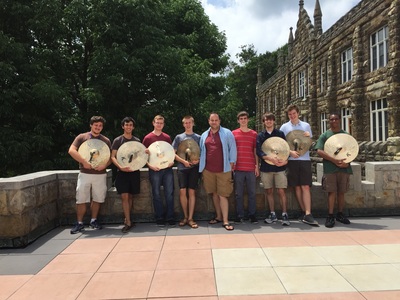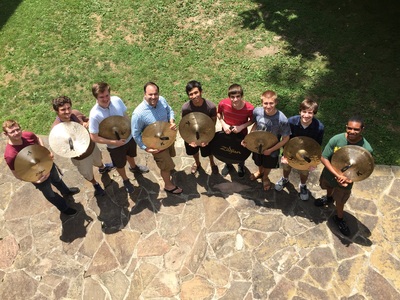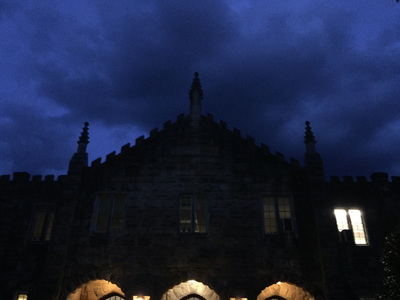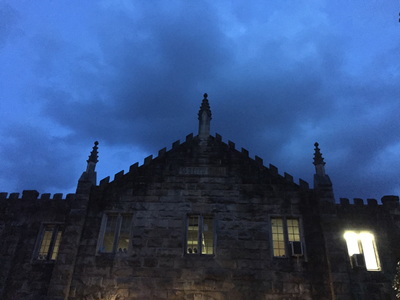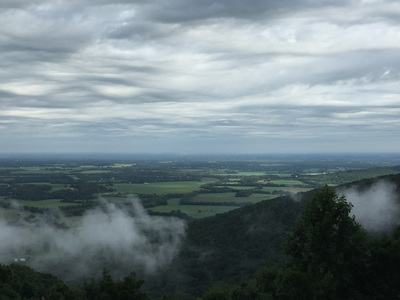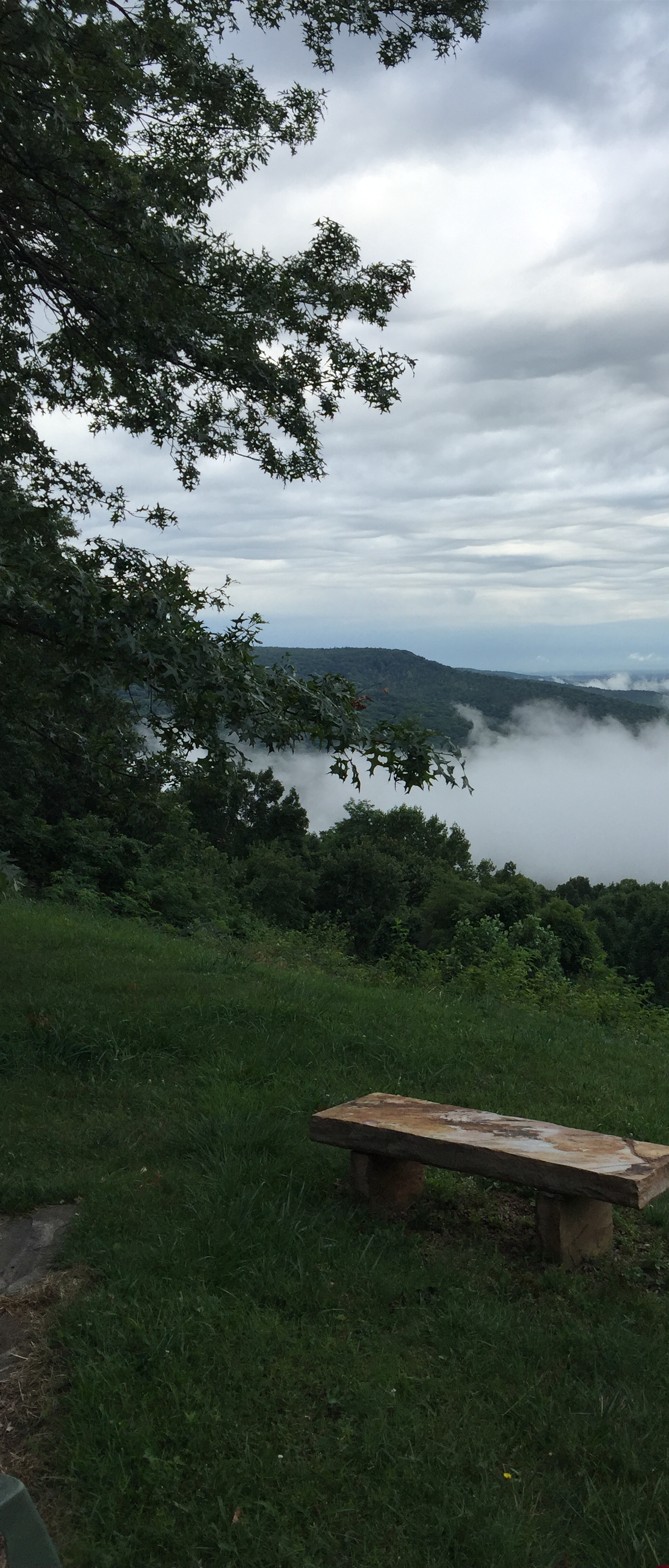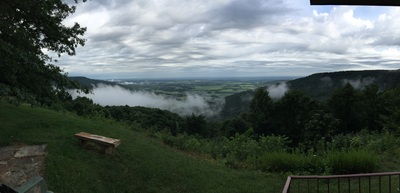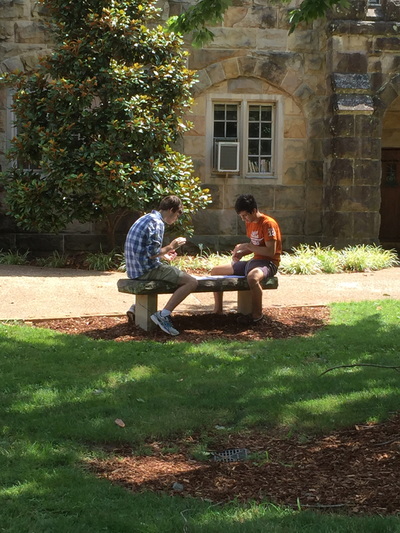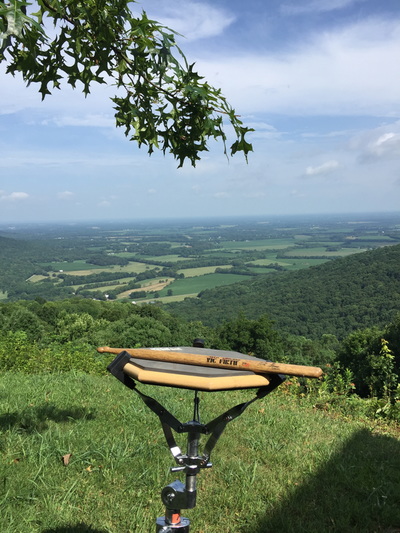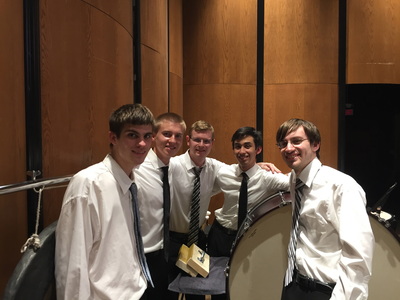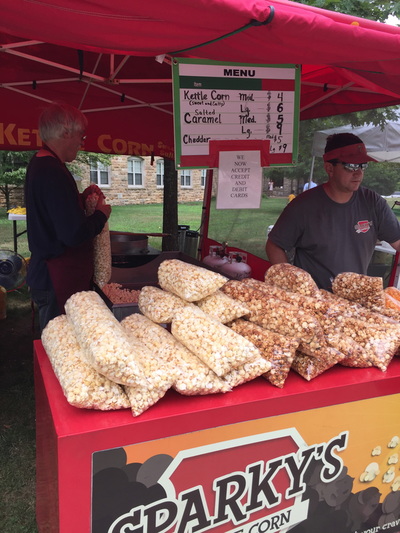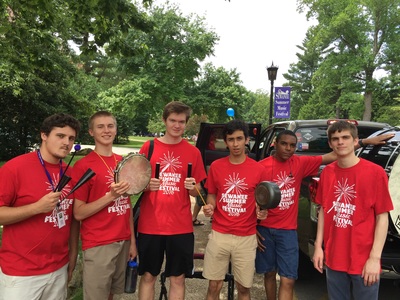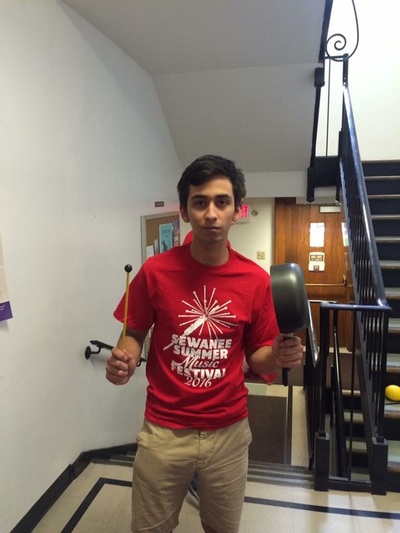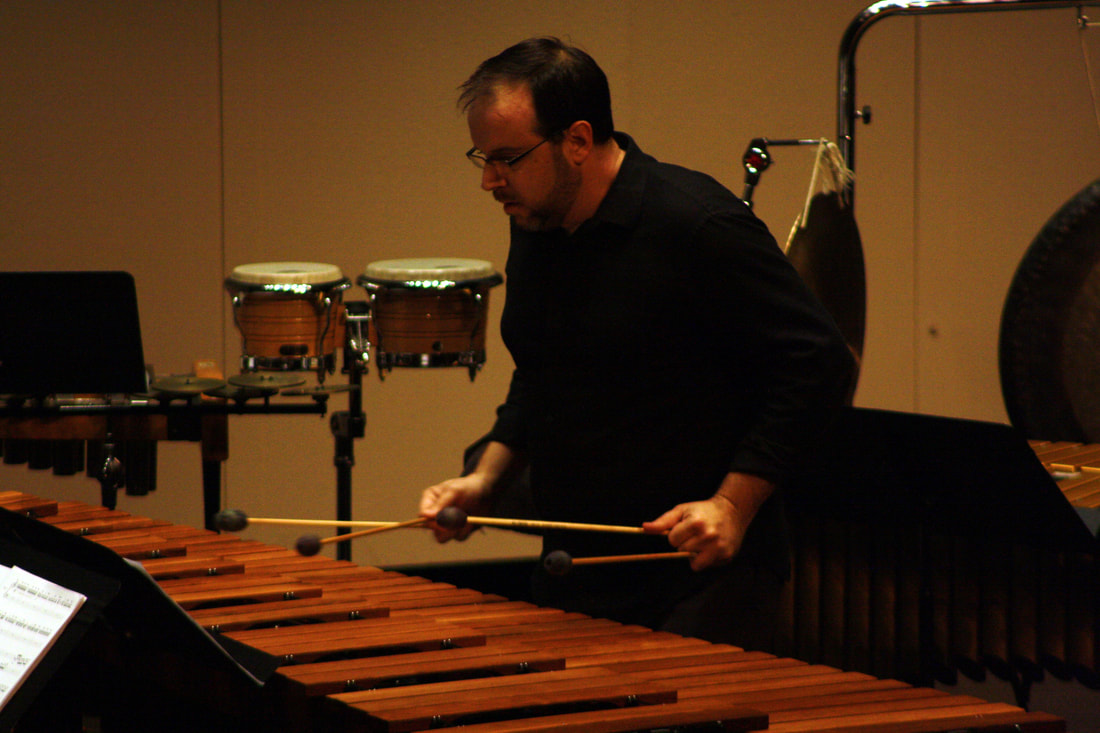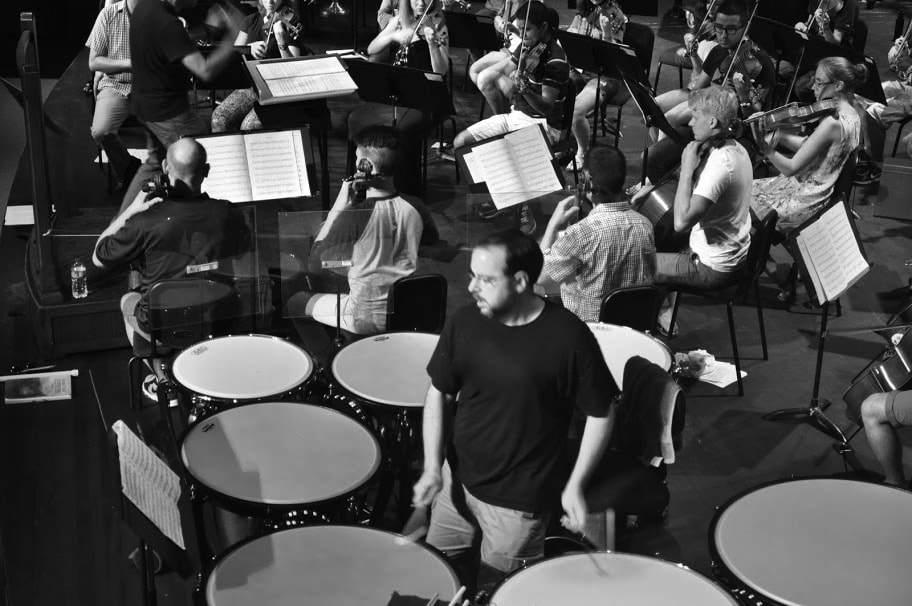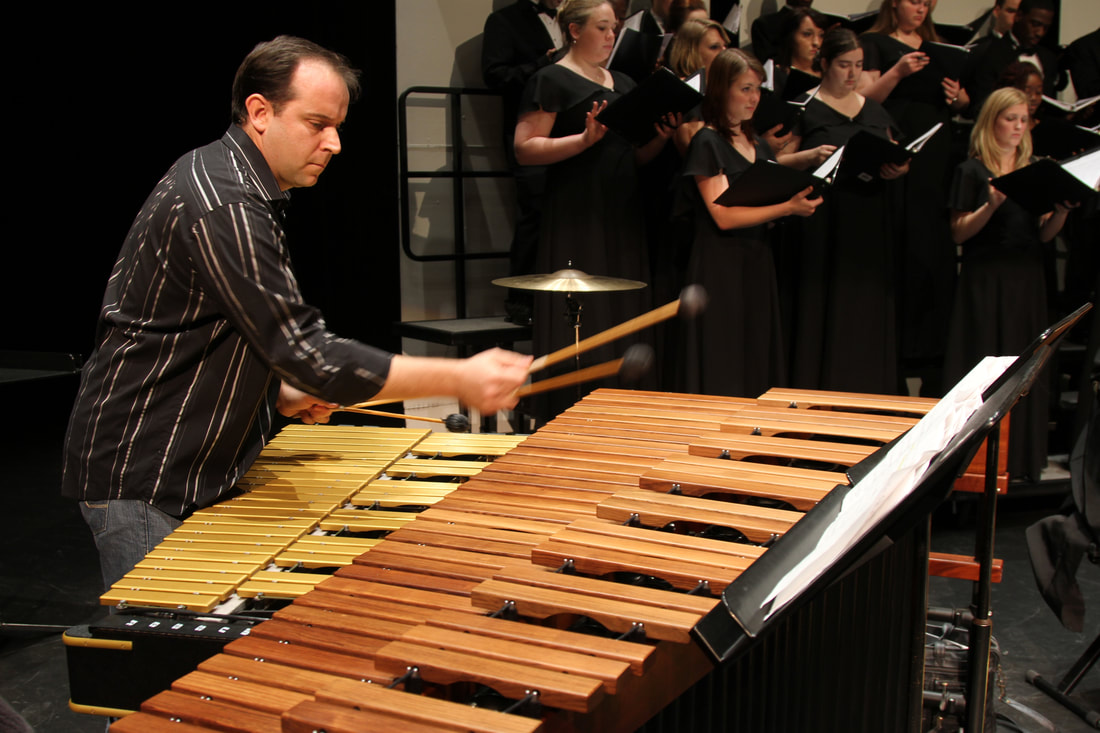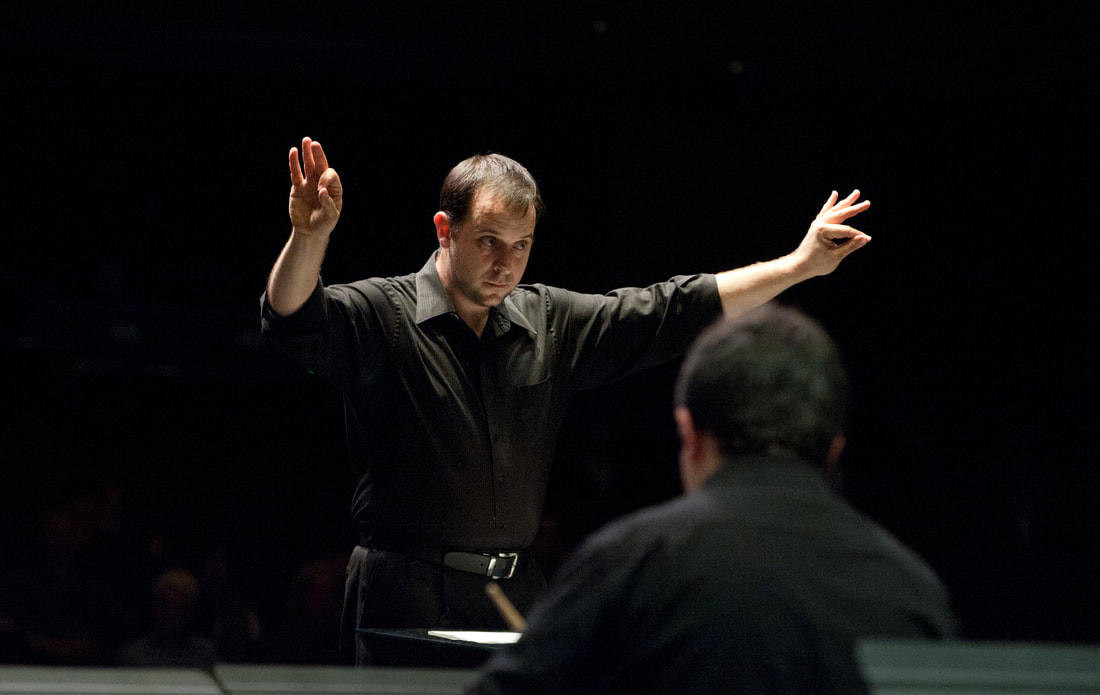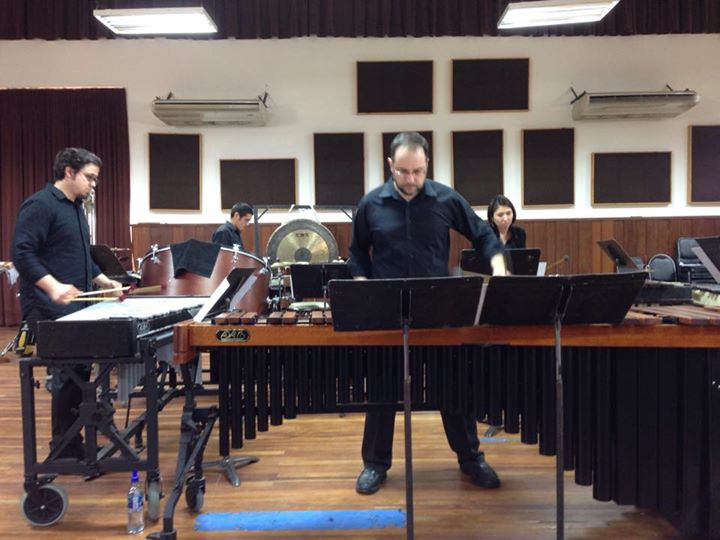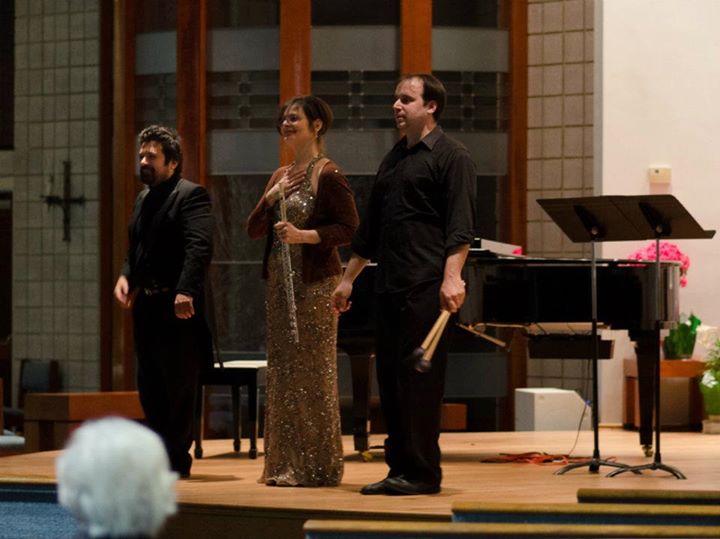|
I have been traveling a lot lately, going to my offices in Sewanee to plan the festival, giving clinics and classes at schools and university programs, guest conducting etc...
And it makes me think - how you spend your time on the road is really critical We do not often talk to our students about this aspect of the job - flights, hotels, late dinners at ruby Tuesday’s ( where I am currently sitting). We don’t tell them much about working early mornings in hotel rooms to get rehearsal schedules out, or updating your blog from a bar.. Quite a a bit goes into the wacky music career - often things we don’t even think about at the time. But so much of what we do as musicians is about being out there, in the business, doing things. But then, you have to balance the doing with being home - practicing and working in your own city. I think a lot about how I use my time and try hard to manage the trips so that they make sense, professionally. I’m excited to head off to Music for All later this week, which no doubt will offer it’s own challenges and opportunities. The groups will be great and trying to give them feedback will be exciting. Looking forward to hanging with good friends and sharing great ideas ( and having a least a couple of good meals in Indy!) So get out there - but think about what you are doing and ask yourself - is this relevant?? Is this moving me forward ? If it is, go for it - if it isn’t. Go home and practice, hang with your significant other - it’s not worth being away just to be away .... So....I am the new Artistic Director of the Sewanee Summer Music Festival. This is not a small thing, for me professionally, or percussionists more broadly. Sewanee is an orchestral and chamber music festival - to have a percussionist in charge of artistic direction - well it is kind of wild actually.
I am honored, humbled, and really tired - but mostly just very excited to have this amazing opportunity. more soon I have been thinking quite a bit lately about time....how much there is, how to manage it,and how to make the most of the time you have. Of course,and millions of words and hundreds of books have been written on the subject already, so I do not expect to blaze any new trains here. However, one idea that has wrapped around my brain in recent weeks ( as I have been reading and exploring the topic of deep work, time management and priorities) is this - The best possible way for me to be successful, or for any musician to be successful, productive and happy, would be to try to follow one rule - do only that which is possible to be done by you, and you alone. Delegate everything else.
So - what does that mean, exactly. I'm still working through that myself, but I have been asking myself this question each time I approach a project, and it has been clarifying on many occasions. Certainly something I'll continue to ponder over the coming days as weeks, as my career takes another interesting step forward I've been taking some time recently to catch up on my reading, both reading for pleasure and reading to help expand knowledge. I enjoy reading and quite honestly didn't give my self enough time last year to make this an option. One of the changes I've made for this year - space to read.
Another performing and teaching year has started, though I don't think I can really tell anymore when one ends and one begins. This summer, after a two week tour of Costa Rica, I left for one my favorite places in the world, Sewanee, TN and the Sewanee Summer Music Festival. I write about SSMF frequently, and I look forward to sharing more about this great festival as the year goes on. During SSMF, I left briefly for the Music for All Summer Symposium - had a great time as always with everyone there!. Music for All has been a big part of my professional career, and I very much enjoy the chance to work with the dedicated folks who make that organization run!
Right after SSMF, I was off to Orlando to play to at the 2017 International Clarinet Convention to premiere a new work by Howard Buss with my good friend Kathy Mulcahy. We had a great time, and as always Kathy was terrific. It was an honor to share the stage with her. Musicians have seasons to our lives - rather than make resolutions at the end of the year, I typically review my work/ideas/process in August, and again In January, during what is usually a (slightly) slower time in life. This year, I have resolved to read more ( so far, so good), write every day ( mostly going well) and update by blog regularly. Let's see what happens!!! Here in Sewanee now ( actually sitting at the Chattanooga airport flying off to music for all...but that is another story....) and finding a few moments to reflect on the two weeks I spent in Costa Rica with the inaugural International Teaching Scholars program. This entirr project started with a conversation, and ended with 14 faculty, staff, donors, and administrators from George Mason University traveling to San Jose and the surrounding communities for performances, volunteer work and teaching opportunities. The trip itself is too complex to explain in one post....so I'll start with some pictures..... The entire experience was transformative for all involved. First....some pictures: This week begins my 7th summer as percussion artist faculty at the Sewanee summer music festival. When I started, we had a small studio with limited instruments and even more limited abilities. I was clueless as to how a festival program should run, and totally insecure about my ability to do the job. On top of that, one of my biggest supporters and the primary reason the previous director hired me, Bruce Dinkins, passed away the day before the festival started. I was overwhelmed with grief and pretty lost all together. 2011 was a hard summer.
Fast forward a few years, we have a new director, awesome equipment provided every year by Yamaha, and outstanding students from across the world coming to study orchestral and chamber percussion. I am enormously blessed, but also realizing that beyond luck or blessing or whatever else you believe in, you have to have a vision. You have to have a long term plan for your career, and the willingness to invest time, energy effort and money into that vision. I could have walked away from this festival after that first summer..... But I knew that having a summer festival home would be enormously valuable to my professional development, and that if done correctly, would hold a special place in my life for many years. So, I made it work, and I developed recruiting networks, and I worked my butt off, and now...well now we have a pretty sweet festival experience for advanced high school and college percussionists. On the top of a mountain. In Tennessee. Imagine that. See you this summer This was back a few years ago - having a great time with the wonderful students of the cumberland orchestra at the Sewanee Summer Music Festival - enjoy! FYI the camera was really close to the perucssion....!!! I find this time of year can become a period of reflection for me as a performer and teacher. After months of being very busy running a program, traveling for concerts, clinics, conducting etc...I am able to sit back for a couple of weeks, and just be "busy". Just the normal everyday running of a career and a life, not quite the breakneck pace of January-March.
There are a few periods in the schedule that open a bit - usually August, sometime between Christmas and New years, and of course this slight relaxing of the schedule before the busy summer season. I try to think and reflect a little during this time about what I can do better, how I can improve my life, my career and overall just become more efficient, thoughtful and productive. I also think it's time for me to go back to the gym... One of the ideas/concepts that I continue to ponder is the challenge of the music business. Not that what I do, or any of us do, is "hard". Curing cancer is hard - dealing with childhood poverty or climate change, this is difficult. Music, on the grand scheme of life, really isn't challenging in the same way. However - there is no question that the business of music is tricky. There are more people who want to be musicians than we have room for in the business. Stability, vacation, and retirement can me harder to realize. It certainly requires a high degree of creativity and "outside the box" thinking. I also think, to be candid, it requires people who are mentally tough. Regardless of your chosen path in music, if you are teaching college, running a chamber group, taking auditions or playing in an orchestra, you need to be mentally strong. Regular rejection, judgement by your peers, and long hours alone in a room are all hallmarks of a career in music. Traveling, touring, recording....challenging and draining both mentally and physically. Dealing with prospective students and parents, administrators, grant managers, all require someone who is mentally agile and willing to be creative. Beyond all of this, you are often alone - writing, practicing, studying. You need to be the kind of person who can build personal networks so that, from time to time, you can walk away from the work and go play a round of golf......you have to recharge before you get back to work. So - in all of your practicing and studying, add one more thing to the mix. Mental toughness, a thick skin, and the ability to balance competing priorities. You'll need all of it to be successful in this business one of the best pieces of advise I've ever given a student was " don't do what I am doing, do what hasn't been done yet". Often in the arts we are taking to students about careers of the future, and imagining what is out there to do. Telling students they need to craft their own career. And often that's where we stop, and the student is left sitting there going " ok cool so WHAT DO I DO"
here are a few things to consider when thinking about your career: What is NOT happening in your art form that you want to see happening. " Where is there "Blue Ocean" Are you the right person to do the "thing" that hasn't been done yet? Have you considered why it hasn't been done? what other interests have a stake in your idea? Can you partner with them? Is there a collaborative opportunity that you are unaware of that could lead to another, even greater project. For example, early in my career I was teaching at a summer band camp....and I was kinda, well... bored. I wasn't enjoying the experience anymore and was frustrated with the opportunities I had. At the same time, I looked around and didn't see any local/regional program that was designed specifically for high school percussionists who wanted to major in music, or for kids who just loved playing. There were band camps, drumline camps, but nothing for concert band kids beyond middle school camps that were mostly glorified daycare. Or they had to travel half way across the country.....in short, I identified a need ( something for kids to do with drums) and aligned it with the needs of a program ( get high school kids on campus) and so....long story short, I put a program together, pitched a proposal, and the University of Maryland summer percussion academy was born. Im leaving out a lot of work, and a lot of details, but in general, that is how it happened, and even though I had no idea how to run a camp, I did my homework, worked really hard, and created a program that gave me an opportunity beyond what I was doing and helped me build connections and create relationships that are valuable to this day. Many great ideas start with nessessity....("I don't want to do this anymore" ) or perhaps with the need for a change. Sometimes, projects are created because people discover the opportunities available don't interest them, or fit into how they view their career. Whatever it is, think carefully about what you want, and pay close attention to the "scene". If you find an opportunity, take it, and make its happen. This is a fairly common question from students.....particularly those approaching the end of a milestone period in their training, such as the end of a degree. How do I know I'm ready to start in the real world? Other professions have easier ways to determine the answer to this question - internships, entry level positions etc... And while we have these in some aspects of what we do, the truth is, becoming a professional musician and the timing of this event can be harder to determine.
So, I figured I would share some thoughts,. You our are a professional when.....wait for it...... When you start acting like one. When showing up on time isn't an option When you are done with school and don't wanna go back to school and want to start testing all of your theories as an artist. When you have something to say as a musician. When you have to courage to persue your passion and the skills to get someone to pay you. There may be a degree, or you may meet all (or some) of these criteria before you get a degree. I was getting paid to play drums well before I was out of school, but there were things I couldn't do and didn't know....I was an apprentice pro...for lack of a better term. So, You are a professional when you decide to act like one, to grow up and be mature. To speak plainly and directly to people, to remain calm and focus on the goal. To think about your actions, plan your career and enjoy the ride. That is when you are a professional. Enjoy Since the start of 2017, I've been traveling - a lot. Here are a few things I've been fortunate to do January one week in Costa Rica - master classes Performed on the Mason Bates, Kennedy Center Juke Box chamber music series February NYU and University of Michigan Residency's. Clinics, master classes and recital ( at the U of Michigan) More Kennedy Center Juke Box Conducted the Marshall University a Honor Band Outreach concert at the Sitar Center in DC March Concerts with Michael Burritt Music for all National Festival Mason Symphonic band concert Played a faculty recital Conducted the music for Robert Battle's Mass for the School of Music Dance Gala April Hosted Jonathan Haas at Mason Did a couple of clinics at the University of Tennessee Performed a duo recital at the National Gallery of Art in DC And here we are - in April - with a major tour of Costa Rica coming up, a summer series at the Sewanee Summer Music Festival and a performance at the clarinet festival in Orlando Fun to be busy!!! Pleased to share the first of many video's from our 2016 Mason Percussion performance at PASIC. Franco Donatoni, Darkness So - after you vote...what are you doing? Hopefully going to PASIC! If you are, check out a couple of performances by Mason Percussion 11AM - Focus Day performance- Franco Donatoni, DARKNESS 4PM - New Literature Showcase Concert I've attached the program for our 4PM concert below. Excited to bring this much new music to PASIC
Recently, I was re-reading a short interview from the Juilliard Journal with Dan Druckman. Dan was
(and still is) chair of the percussion department and director of the percussion ensemble at "the yard" and is just simply one of the finest musicians I ever had the chance to work with. I was lucky to play in his group and have the chance to take a handful of lessons with him during my college years. In the article, Dan said that he wants his students to do whatever is necessary to be prepared on stage Somehow, reading this now, where I am in my own career, really resonated with me. This sense of doing what is necessary, with the underlying subtext being ( no matter what) is often missing from today's teaching. I can assure you, I did not always feel like I was in "a safe place" in Dan's rehearsals, or in Jonathan's rehearsals, or in Abel's lessons - but those experiences sure did drive me to do what was necessary to be prepared. I would practice when I was tired, or it was late, or I was hungry, or whatever....I did what was necessary. As students, you aren't always going to feel good about what you are doing - hell you may even really dislike your teacher or ensemble director for a period. I certainly had negative thoughts about my teachers/conductors. At the risk of sounding like the old man yelling at kids on his lawn - the job of a teacher isn't always to make you feel good (!!!!). I do think about my students well-being ( often more then my own teachers did) but at the end of the day my job is to prepare you for a VERY challenging profession. playing in an orchestra, working as a chamber musician, teaching at the college level - these are difficult and rewarding professions - you have to be ready to make it happen. I didn't always do what was necessary, but when I did, each time it produced a performance that I still remember to this day. Students - if you are serious about this - Do what is necessary. Practice at night, in the early AM, when you are sick, when you are "sad". Study scores, go to concerts, network - do, what is necessary. Since the start of my professional career, either by design or by decree, I've been closely involved in recruiting students. I would like to think I've build a bit of a reputation as a program builder.
Beyond anything I've done as a player, conductor, or teacher, one common theme has been the ability to attract students to programs, but year round academic programs and summer festivals. Some people think this is not a teachable skill, that you either "have it" or you don't. I do not believe this is the case. Recruiting is a skill, something that can be studied, practiced, and personalized. I've learned quite a bit talking to hundreds (if not thousands) of students and parents over the last 15 years. What works, what doesn't and what it really takes to get someone into your program. So, some thoughts, which may or may not turn into a larger lecture/clinic/presentation Meet people where they are: Most often, if you are being brought into a program to "build" or "develop" you are likely taking over a program that has been neglected, or was never fully developed in the first place. You have high expectations, clear ideas as to what you want to accomplish, and the personal talent to make it happen. But you don't have the people to impliment your vision. The first thing you MUST NOT DO is "beat up" what you have...you need to meet the students you have where they are and build them up. Set a standard and hold them to it, but Don't lie to them ( "you are the most amazing group of students EVER"), BUT DON'T ATTACK THEM EITHER. You start with what you have, give them some early successes, and build from there. Think about "quality of life" issues first Again, try to score some quick victories. Is the studio dirty? - get it cleaned up. Instruments need repair, do some simple repairs to make things function better. Lost equipment? Create an inventory. Take care of them a little, and they will take care of you. Think about the culture Be around. Go to student concerts. Check out their rehearsals. Show them you care about what they are doing now. If you are at a college program, visit the academic advisor and get the course outlines. Set a standard and show that you are involved. Take an interest in the students. Ask how their classes are going... Let them know you care and that you are paying attention. Have some early victories create opportunities for the students to achieve. Get them on a concert series, bring them to a local school to perform. Invite guests to work with them. Don't apply to PASIC after a year, but create opportunities for them succeed. Just a few suggestions. Step two.... What do you do when you've started to build something. Adjusting expectations, raising the bar, and creating a competitive yet inclusive environment. Summer is over ( even if it is hot outside) and we are back to another semester of performing and teaching. Even with my summer festival work at Sewanee and Music for All, there is still nothing like the feeling of this time of year. The excitement, the anxiety, the potential. The clean studios. The freshly dry-cleaned shirts. It is great. I love it.
Also - I think it's a good time to remind all students studying music who may read this of one important thing: You. Are. not. A. Special. Snowflake. Congratulations on making it to a college or conservatory program, good for you. Now, that's enough. No more congratulations until you do something with your career. You have to get to work. It is no one's job to motivate you - you made the decision to go into music. Somewhere, right now there is someone practicing who is going to beat you at an audition. When you are complaining your teacher is mean to you, or the practice rooms are too hot, or too cold, or the marimba isn't at the right height, or the timpani aren't completely clear - some kid is playing on lousy drums, in a small hot room - and that kid is going to whip you in an audition. Also - while I'm at it - I'm not a special snowflake either. I need to keep practicing, working, studying, reading and learning to get better, smarter, and more effective as a performer and teacher. So - enjoy the first week back, catch up with your friends, check out a party or two...and then get into the studio and do the work. No one else can do it for you. I have been thinking quite a bit this summer about careers, and the progression one takes from high school ( I think I want to be a music major) to college ( wait, am I a music major?) onward to graduate school (OH GOD I'M A MUSIC MAJOR). How do we prioritize what is important at each step, what matters, and how much a student should have the opportunity to do their own thing VS. following the path before them.
I have never really been a "do your thing" kind of player, or teacher. There are, in my view, clear pathways set down before every student, and before you can re- invent the world, you have to actually the right things, first, in order to become a solid player and musician. From time to time I have students ask me questions that are basically variations on the theme "why do I have to do this this way"' why do I have to play Bach, or Time for Marimba, or excerpts or whatever.... And my answer is, because every developed player in the world prior to you has done this, so do it.... And I'm finding this answer not working as well as it use to. Let me be more direct. You can have the coolest skinny jeans in the world, and the slickest website, and the best elevator speech in the history of classical music.... If you cannot produce something meaningful as an artist, then you are just an empty shell. A fraud. You must understand how music works, understand the classics, and be able to produce great art from the established cannon, or you are just a joke. I find often ( but not exclusively) in the percussion world that students can become more concerned with endorsements, social media and content marketing then the mechanics of being an artist. When you are a student you have one job.....Learn. How. To. Be. A. Musician. You do not need a website, or a fan page, or snapchat. You need to learn how to play well. REALLY well. You need to listen to your teacher and colleagues and other musicians. And go to concerts. And learn about music. All kinds of music. Attend festivals, and practice.... Relentlessly. To me there is no shortcut, no way around the work of practicing and studying. Do that, and other things will work themselves out. This does not mean you ignore learning the business, or networking, or thinking about what you want to do... Heck I wrote a blog post about career planning....and My own career has taken paths that I did not expect in the least. However, I'm deeply grateful I learned how to play.... I did not have a website until I had a career, my YouTube channel didn't get me one festival job, and not one student has come to study with me because I have Instagram. I have what I have, and hopefully my career as a player, teacher and conductor will continue to grow because I am good at what I do, not because of hits on a website. Go, get to work. Learn your Bach, your Porgy, your 2/3 clave, and your Carter. Talk to me about a website or matching jeans in a few years. our 3rd annual summer percussion academy at George Mason University. I've been thinking about time lately. Years ago, when I was in college, someone said to me " the most valuable thing you have in your life is time" and I didn't know what they were talking about. Cause I had TONS of time back then. Now - I still have time, but not as much as I did when I was 20. I have more responsibilities now, of course, and less time to just do "what I want". I think students forget that they have a short window of time in their life to actually DO what they want to do - 4 years seems like an eternity - yeah.... it isn't. You must make the best of every moment you have - each lesson, ensemble rehearsal, clinic, master class, all are important. You also have to learn and study and think about priorities - what matters now. You have to juggle what matters to you, and what matters to your teachers, friends and family. Early in your life, you are likely not able to set very many of your own priorities - you are learning pieces that your teacher gave you, or writing papers that someone else assigned. Gradually, you'll start to have to take more ownership of your own life, and time, and how you use that time. What you do with that time will set the stage for your career and your life. Asking - "why am I doing this, does this get me to my end goal" is an important question to have at the front of your mind. Don't just float through the business - manage it, plan, and use the time you have to the best of your ability. Before you know it, someone will want you to actually make a living doing this There are many great books on the topic of time management and planning. I've found First Things First by Stephen R Covey ( author of the 7 habits of highly effective people) to be useful. Also, for a more focused book on the music career, I can recommend Beyond Talent: Creating a Successful Career in Music by Angela Myles Beeching. Over the next few weeks I'll be posting additional books, lists and ideas on the topic of career planning and performance. Some great images from the summer- I'll be posting items from Music for All and more performances from the 2016 Sewanee Summer Music Festival
I'm nearing the end of my 6th summer at the Sewanee Summer Music Festival. my first engagement at Sewanee was in 1993, I was a dopey high school kid who thought music was fun, but basically had no clue about the profession. When I left Sewanee that summer, I was still pretty dopey, but I came home with one major idea - I love music, and somehow, I'm going to make this my profession. Period. It took me many years to actually become a professional, and I had many more influences along the way - but I can look to this one specific moment, summer 1993 at the Sewanee Summer Music Center( now festival), as the spark, the moment that sent me down the path I currently walk. I will always be grateful to the teachers I met and worked with that summer, many of whom, Frank Shaffer and Bruce Dinkins in particular, became lifelong friends, mentors and colleagues.
Summer Music Festivals can be transformative places, intensive opportunities to try out new ideas, perform, take risks and really think about why and what you want to do as a musician. They are also places to improve, push yourself and see how you stack up against players from other programs across the US. I've made lifelong connections from my experiences at various festivals, and I would not trade what I learned there for anything - my summer music experience is at least as valuable as anything I did in college or graduate school. When I student tells me " gosh, I really want to do a festival but they are too expensive" or "I need the time off" or "I don't know, I think I'll just stay home and practice" I usually get pretty annoyed. If you are serious, you invest in yourself, in your education and in your career. You have your ENTIRE lifetime to work, but you won't work the way you want to if you do not invest in developing the musical ideas, playing experience professional networks needed to be a successful musician. GO - go right now, and start planning for your 2017 summer festival experience, you will not regret it. Over the last couple of weeks - I've done the following
1. Hosted Virginia All State Band and Orchestra at Mason 2. Played 10 performances of Carmina Burana at the Kennedy Center 3. Played ( and continue to play) Anvils in Das Reingold with the Washington Opera 4. coached chamber music/ taught private lessons 5. taught lessons 6. recruited students 7. Planned my part of a summer festival 8. practiced 9. did a clinic for a HS orchestra 10. prepared my college band for an upcoming concert at some point, I'm sure I slept, ate and maybe even made some time for friends/family. This is called a life in music. It is a snapshot of what I do, and likely similar to what other musicians do every day. I am lucky - most, if not all of what I have listed above is work that I sought out, and I am honored to have had the chance to do - it is diverse, interesting, challenging and fun. I'm grateful to have had the opportunity. This is called a life in music - it is about being organized, dedicated, driven and focused. It is about selecting and using your time wisely, and being open, regularly, to self evaluation and review of processes. It is about working hard, and understanding that the phrase " I wanna be a music major" doesn't mean just "I wanna play" but it means being committed, in my view, to a career in the music industry that is dynamic and rewarding a short post I hope to expand on later.
I love when students audition for our program and tell me "I want a career in an orchestra" This is still the standard path for percussionists, and typically one of two ( the other being marching percussion) access points or inspirational moments for most young players However, the more I teach and the more I see what's happening in our field, I would like to offer a suggestion Prepare for a career as a musician, not for a career taking auditions. You don't know what the business will look like and you don't know what your career will become. But if you are dedicated and prepared and a little lucky, you'll be able to do well. Study with people who prepare musicians, not excerpt jocks. As an undergrad, Learn how to play in an orchestra, play in a chamber group, play solo percussion and marimba. Become a better musician. Prepare for a life in music. |
John KilkennyWelcome! I am a percussionist, conductor and artistic leader who drinks a lot of coffee. |
||||||
